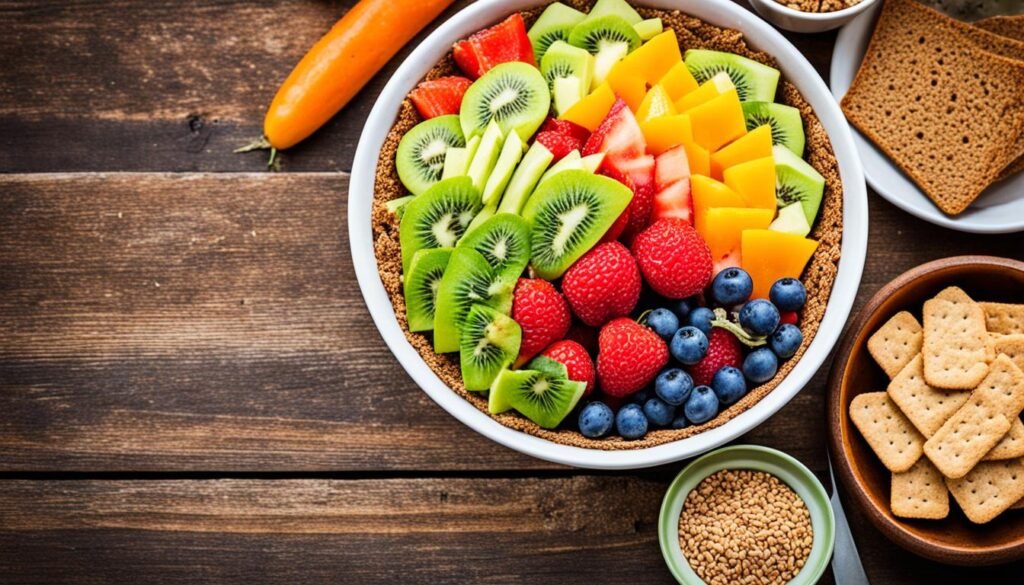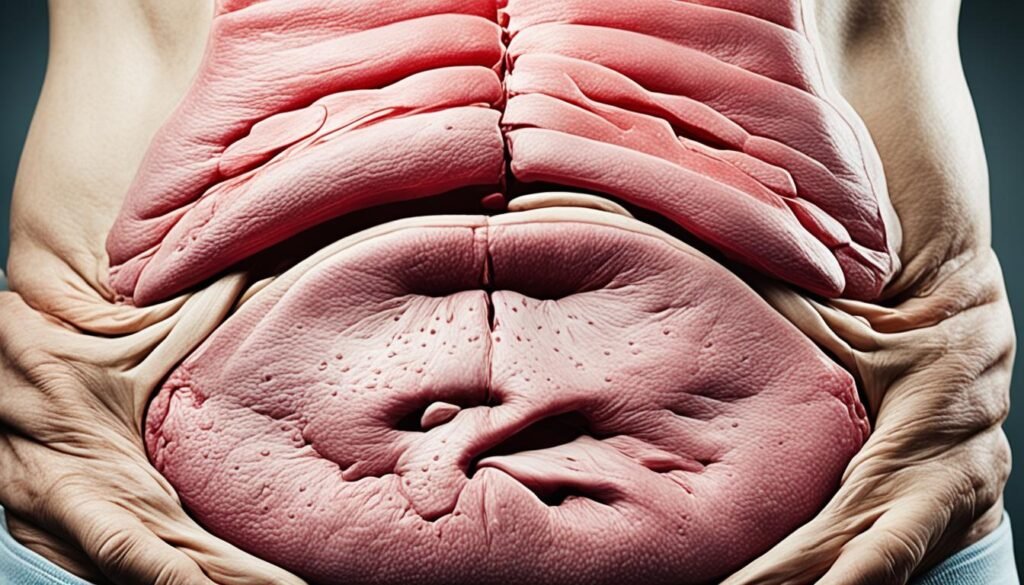Did you know constipation affects up to 27% of people in the UK? It’s a common problem that can make you feel uncomfortable. If not treated, it can cause more health issues. Luckily, there are many natural constipation relief ways to help your digestion work better.
Things like eating more fiber and drinking plenty of water can really help. So can activities like exercise for digestion and using probiotics for gut health. There are also herbal laxatives and gentle abdominal massage for a softer method.
Key Takeaways
- Constipation is a common issue affecting up to 27% of the UK population
- Natural remedies like increasing fiber intake, staying hydrated, and exercising can help relieve constipation
- Probiotics, herbal laxatives, and abdominal massage are also effective home remedies
- Adopting a high-fiber diet and drinking adequate water are key to preventing constipation long-term
- Seek medical attention if constipation persists or is accompanied by concerning symptoms
Understanding Constipation and Its Causes
Constipation is a common issue that affects many people’s health and well-being. It’s when someone has less than three bowel movements weekly that are hard to pass. This often leads to straining and longer time spent in the bathroom.
Common Causes of Constipation
Many things can lead to constipation. It often shows there’s an underlying health issue. Causes include not drinking enough water, low fiber in food, stress, and other medical problems. Not getting enough fiber or water is a common reason for constipation. Also, not moving around enough or a change in your daily habits can make it worse.
Knowing the signs of constipation and its possible health impacts is crucial. Long-term constipation can cause discomfort, bloating, and even more severe issues if not dealt with.

7 Home Remedies to Relieve Constipation
If you have constipation, don’t worry. Many home remedies can help. You can improve by eating more fiber or using gentle herbal laxatives. These methods are safe and without harsh effects.
Increasing Fiber Intake
Adding more fiber-rich foods to your diet is key. This means more oats, whole grains, fruits, and veggies. They add bulk to your stool and help you go regularly. You can also try a fiber supplement like psyllium husk.
Staying Hydrated
Keeping well-hydrated is very important for easing constipation. Drink at least 64 ounces of water daily. It softens your stool, making it easier to pass.
Incorporating Regular Exercise
Moving your body is good for your bowels. Activities like walking, yoga, or light aerobics can help. Even a short daily stroll can improve bowel regularity.
Trying Probiotics
Probiotics are good for your gut. They help balance beneficial bacteria. You can get them from foods like yogurt and kefir, or from supplements.
Using Gentle Herbal Laxatives
Herbal laxatives like senna or aloe vera can gently help with constipation. Before using any herbal remedies, talk to your doctor. This is especially important if you have health issues.
Practicing Abdominal Massage
Massaging your stomach can get things moving. Try making circles or gently kneading your abdomen. This can help your digestion and ease constipation.
Limiting Constipating Foods
Avoid foods that can make constipation worse. Stay away from snacks that are low in fiber and processed. Instead, focus on eating foods high in fiber and that keep you hydrated.

Dietary and Lifestyle Changes to Prevent Constipation
Eating foods packed with fiber can keep you regular and avoid constipation. This includes stuff like oats, whole grain breads, and fruits like berries. They make your stool larger and help your gut stay healthy.
High-Fiber Foods to Include
Men should get about 30 grams of fiber a day, while women need around 20-25 grams. But, most adults don’t eat enough fiber. By choosing foods high in fiber regularly, you can fight constipation and keep your gut in good shape.
Importance of Adequate Water Intake
Drinking plenty of water is key to staying hydrated and avoiding constipation. Water makes stool softer, which is easier to pass. Though the CDC doesn’t set a specific water goal, the NHS recommends 6-8 glasses a day for adults.
Establishing Regular Bowel Habits
Along with fiber and water, making a regular habit of going to the bathroom is important. Try to go at the same time each day. It helps many people make going to the bathroom part of their daily routine.

When to Seek Medical Attention
If you’re constipated for over a week and nothing is helping, see a doctor. They can check for serious problems and create a plan to help you. Get medical advice if you feel dizzy, tired, or have painful spasms along with your constipation.
Have you tried home remedies and store-bought medicines for your constipation but they didn’t work? Your doctor can look at what you’ve done and suggest more things to try. They might also recommend stronger medicines if needed.
You’ve changed your diet and habits but still have constipation? It’s wise to see a health expert. They can find the reason and advise on laxatives or other remedies to help you go regular again.

Conclusion
Many home remedies can ease constipation. You can improve by eating more fiber, drinking lots of water, and moving with exercise. Adding probiotics to your diet and using herbal laxatives can also help. It’s good to avoid foods that cause constipation too.
Changing what you eat and how you live can keep constipation away. Try to eat high-fiber foods, drink up, and follow a regular bathroom routine.
If constipation lasts or if it makes you worry, see a doctor. They can find what’s wrong and help more directly. Using the tips mentioned here, you can keep your stomach healthy and beat constipation.
This info on fixing constipation at home is useful. But, always talk to a doctor if you’re really worried about your stomach. With proper care, you can overcome constipation and feel better again.

I don’t think the title of your article matches the content lol. Just kidding, mainly because I had some doubts after reading the article.